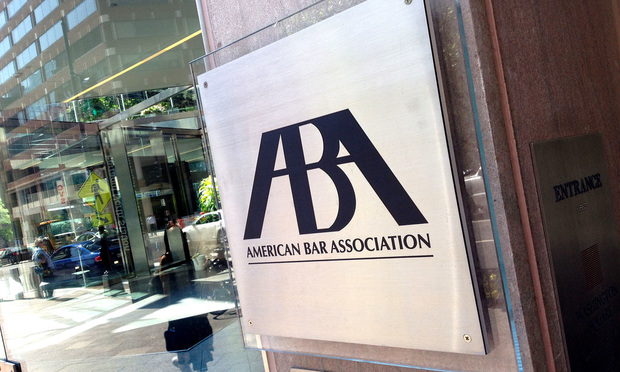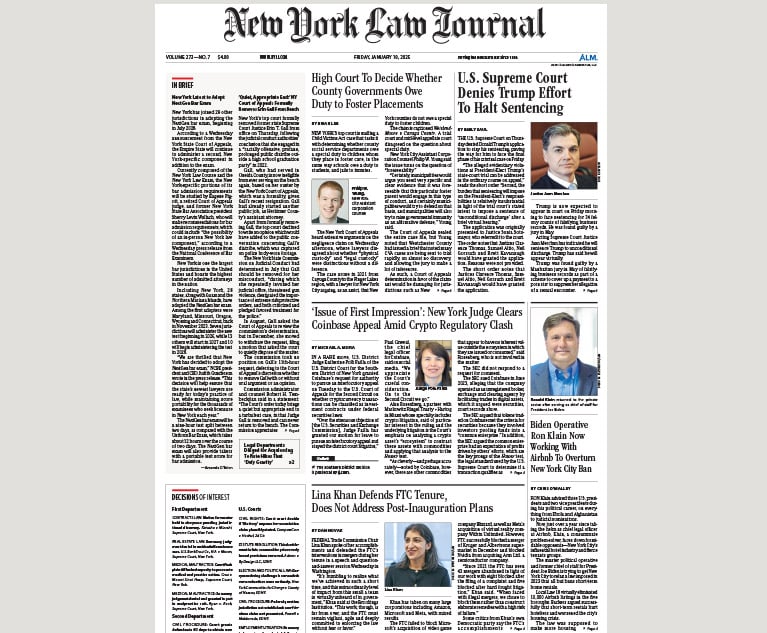Bar Groups Line Up Against 'Dangerous Changes' to Lawyer Regulation
"Outside ownership of legal providers would present a minefield for the profession," said a letter from New York bar leaders voicing concern about a pending ABA proposal.
February 05, 2020 at 04:02 PM
5 minute read
 Photo: Diego M. Radzinschi/ALM
Photo: Diego M. Radzinschi/ALM
A proposal before the American Bar Association that would encourage states to consider "new approaches" in the practice of law is facing mounting opposition by some state bar leaders who say it will lead to outside investment of law firms and nonlawyers practicing law.
New York bar leaders, in particular, are seeking to lead a coalition of opposition. They've sent a letter to the ABA House of Delegates—the national bar group's main policy-making body—outlining their concerns before the delegates vote on the proposal Feb. 17 in Austin.
"We ask you to join us in opposing Resolution 115," said the letter, shared with ABA delegates Jan. 30. Signed by Stephen Younger, former president of the New York State Bar Association, and other state bar leadership, the letter warned that "Outside ownership of legal providers would present a minefield for the profession."
State bar associations from Ohio, New Jersey, Illinois, Pennsylvania and Delaware have all taken official positions opposing the resolution, according to Younger, a partner at Patterson Belknap Webb & Tyler.
In an interview, David Miranda, a past president of the New York State Bar Association who also signed the letter, said he believes delegates from at least a dozen states oppose the resolution.
"There is broad-based opposition to this across the country," Miranda said, adding he believes the resolution's report "poses some very dangerous changes to the legal profession."
The proposed resolution, released in the last month, was prepared by the ABA's Center for Innovation, an entity partly funded by the bar group, and in partnership with four ABA standing committees. It calls for state regulators and bar associations to continue to explore regulatory innovations to improve the public's access to justice.
An associated report notes that regulators and bar associations in several states have proposed or adopted practice changes. For example, the report said, Utah has developed a so-called "regulatory sandbox" that will allow new kinds of legal services providers to operate on a pilot basis without concerns that they will be accused of unauthorized practice of law.
Still, the report stopped short of endorsing any one legal service provider model and said the resolution does not recommend amendments to existing ABA models rules, such as the Model Rules of Professional Conduct.
"The point of the resolution is to encourage U.S. jurisdictions to consider regulatory innovations that foster new ways to deliver effective legal services and have the potential to improve the accessibility, affordability and quality of those services while preserving core protections," said the proposal's report, adding the resolution also calls for data assessment related to the "regulatory innovations" to ensure changes are data-driven and in the public interest.
While the resolution is broadly worded and encourages innovation more generally in the profession, Younger's letter sent to other delegates notes specific concerns. It was signed by other past presidents of the New York State Bar Association and current bar president Hank Greenberg.
"This proposal," the letter said, "would allow nonlawyers to provide legal services and would encourage the repeal of professional conduct regulations that prohibit lawyers from partnering and sharing fees with those who are not lawyers."
Miranda, in the interview, cited past proposals before the ABA to change rules regarding nonlawyer ownership of law firms, which have been soundly defeated. But Miranda said the version proposed this year is more extreme, pointing to language in the report about innovative models involving "technologists" or "substantial outside capital."
"We're not talking about [partnering with] accounting firms and architects. We're talking about internet companies and venture capitalists," he said. "You don't need to have fee-sharing when you're trying to provide access to justice to the poor. You don't need to have venture capitalists to fund it."
Even if the ABA House of Delegates votes to approve the resolution, it wouldn't automatically change rules in any state, and the proposal "is not something that will have any legs in New York," he acknowledges.
A vote by the House of Delegates would allow the ABA to lobby, speak publicly on the issue and file amicus briefs. But Miranda said it would have further consequences, by "encouraging the gradual chipping away of the core values."
"If you are now faced with having to satisfy outside interests that are motivated by profit versus the client's interest, that changes things—that changes the profession," Miranda said. "The fact that the ABA through this report is encouraging something that would have a tremendous impact on the core values of the profession is very troubling."
Still, the report notes that traditional efforts to address the access to justice crisis—such as increased funding for civil legal aid and more pro bono work—"have not come close to fixing the problems that exist" and "the problems are becoming more severe."
Daniel Rodriguez, who is chair of the ABA Center for Innovation and whose name is on the report, declined to comment. A representative at the ABA was not available to comment.
Read More:
DC Bar Eyes Revamping Law Firm Ownership Rules
This Insider Says It's Time for Big Changes in California's Legal Industry
California Lawyers Slam Bar Proposals for Fee-Sharing, Nonattorney Ownership
This content has been archived. It is available through our partners, LexisNexis® and Bloomberg Law.
To view this content, please continue to their sites.
Not a Lexis Subscriber?
Subscribe Now
Not a Bloomberg Law Subscriber?
Subscribe Now
NOT FOR REPRINT
© 2025 ALM Global, LLC, All Rights Reserved. Request academic re-use from www.copyright.com. All other uses, submit a request to [email protected]. For more information visit Asset & Logo Licensing.
You Might Like
View All

Sullivan & Cromwell Signals 5-Day RTO Expectation as Law Firms Remain Split on Optimal Attendance
Law Firms Mentioned
Trending Stories
- 1'It's Not Going to Be Pretty': PayPal, Capital One Face Novel Class Actions Over 'Poaching' Commissions Owed Influencers
- 211th Circuit Rejects Trump's Emergency Request as DOJ Prepares to Release Special Counsel's Final Report
- 3Supreme Court Takes Up Challenge to ACA Task Force
- 4'Tragedy of Unspeakable Proportions:' Could Edison, DWP, Face Lawsuits Over LA Wildfires?
- 5Meta Pulls Plug on DEI Programs
Who Got The Work
Michael G. Bongiorno, Andrew Scott Dulberg and Elizabeth E. Driscoll from Wilmer Cutler Pickering Hale and Dorr have stepped in to represent Symbotic Inc., an A.I.-enabled technology platform that focuses on increasing supply chain efficiency, and other defendants in a pending shareholder derivative lawsuit. The case, filed Oct. 2 in Massachusetts District Court by the Brown Law Firm on behalf of Stephen Austen, accuses certain officers and directors of misleading investors in regard to Symbotic's potential for margin growth by failing to disclose that the company was not equipped to timely deploy its systems or manage expenses through project delays. The case, assigned to U.S. District Judge Nathaniel M. Gorton, is 1:24-cv-12522, Austen v. Cohen et al.
Who Got The Work
Edmund Polubinski and Marie Killmond of Davis Polk & Wardwell have entered appearances for data platform software development company MongoDB and other defendants in a pending shareholder derivative lawsuit. The action, filed Oct. 7 in New York Southern District Court by the Brown Law Firm, accuses the company's directors and/or officers of falsely expressing confidence in the company’s restructuring of its sales incentive plan and downplaying the severity of decreases in its upfront commitments. The case is 1:24-cv-07594, Roy v. Ittycheria et al.
Who Got The Work
Amy O. Bruchs and Kurt F. Ellison of Michael Best & Friedrich have entered appearances for Epic Systems Corp. in a pending employment discrimination lawsuit. The suit was filed Sept. 7 in Wisconsin Western District Court by Levine Eisberner LLC and Siri & Glimstad on behalf of a project manager who claims that he was wrongfully terminated after applying for a religious exemption to the defendant's COVID-19 vaccine mandate. The case, assigned to U.S. Magistrate Judge Anita Marie Boor, is 3:24-cv-00630, Secker, Nathan v. Epic Systems Corporation.
Who Got The Work
David X. Sullivan, Thomas J. Finn and Gregory A. Hall from McCarter & English have entered appearances for Sunrun Installation Services in a pending civil rights lawsuit. The complaint was filed Sept. 4 in Connecticut District Court by attorney Robert M. Berke on behalf of former employee George Edward Steins, who was arrested and charged with employing an unregistered home improvement salesperson. The complaint alleges that had Sunrun informed the Connecticut Department of Consumer Protection that the plaintiff's employment had ended in 2017 and that he no longer held Sunrun's home improvement contractor license, he would not have been hit with charges, which were dismissed in May 2024. The case, assigned to U.S. District Judge Jeffrey A. Meyer, is 3:24-cv-01423, Steins v. Sunrun, Inc. et al.
Who Got The Work
Greenberg Traurig shareholder Joshua L. Raskin has entered an appearance for boohoo.com UK Ltd. in a pending patent infringement lawsuit. The suit, filed Sept. 3 in Texas Eastern District Court by Rozier Hardt McDonough on behalf of Alto Dynamics, asserts five patents related to an online shopping platform. The case, assigned to U.S. District Judge Rodney Gilstrap, is 2:24-cv-00719, Alto Dynamics, LLC v. boohoo.com UK Limited.
Featured Firms
Law Offices of Gary Martin Hays & Associates, P.C.
(470) 294-1674
Law Offices of Mark E. Salomone
(857) 444-6468
Smith & Hassler
(713) 739-1250








